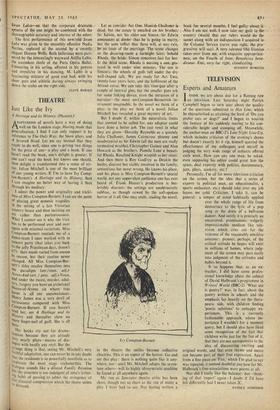All the same, Word of Mouth is worth read- ing
just for the laughs. The theatre people talk like Blanco Posnet--the same corny apostrophic earnestness; and the dialogue is often as crackly and smarty-pantsy as Bob Hope's. The scene when the androgynous Miss Quill, who is writing the musical, rapes John is neatly timed and extravagant; and the language of Ike Ten Eyck, John's mentor and guide, is obscene without ever lapsing into rudeness.
Unlike Mr. Weidman, Calder Willingham makes no attempt to put humour at the service of more sober purposes. His ramshackle hero, Dick Davenport, drifts into a Californian hotel full of film stars, European nobility and wealthy old ladies. Reach to the Stars is almost entirely anecdotal. Whatever is amusing or ridiculous is lazily extracted for examination from the idle and pointless lives of luxury of the hotel guests; so lazily that the casual irony that laps against the reader's attention goes almost unperceived. There are many captions for which Thurber him-
Cairo
A well-kno■Nn authority on the Middle East and a Spectator contributor, Mr. Stewart has here written a resident's introduction to, and interpretation of, one of the world's most fascinating cities. With 16 pages of photographs specially taken by Sayid Has- san, and maps in text. *Extremely authori- tative'— Orford Mail. PHOENIX. 16s.
Also in the 'Cities of the World' series PAR I S by Alexander Reid
Everyman's Reference Library
Everyman's Dictionary of Economics
Compilers ARTHUR SELDON and F. G. PENNANCF The seventeenth volume in the library digests the essential concepts of economics. 'In- valuable to any busincss executive, in- dustrialist, trade unionist, politician, journalist or other professional man'— Statist. 480pp. 25s.
Published by .1. M. Dent 8 Sons Ltd. from Aldine House, Bedford Street, London W.C.2
self would not have scorned to sketch suitable tableaux: the unfortunate Miss Murdock, for example--'0ccasionally, for no apparent reason, more often than not, she would flinch, as if a pistol had been fired by her ear.' And Thur. berish dogs, too: a dog called Woodrow—'On all sides people treated him like hell.' And later on, a nameless pooch, about to be eaten by a famished hermit, delivers a soliloquy in bad blank verse. Mr. Willingham lacks the organisa- tion of a Thurber, and the purpose of a Nathanael West; but he has a random, understating, quite scatty style that is very funny and absolutely his own. Scattiest of all is the way the first chap- ters of the SF which the hero is reading are used to break up the anecdotal drift of the book.
The Drought is not the kind of SF that Dick Davenport would have read in his hotel bed- room. The oceans are so polluted with industrial and atomic waste that water will not evaporate, so there is no rain, and the earth starts to dry up. Happily, Mr. Ballard has subdued his symbolism (something to do with Caliban and Ariel) to the point where it arouses no curiosity, and he has put most of his skill into working up a thirst in the reader with an exciting narrative. The imagery is a little plump at first; but once the world has turned into desert, and the survivors fight on the beaches for water to distil, the meta- phors fit more concisely into the action.
In A Case Examined, a prissy, very middle- class housewife of forty or so comes to a humane decision about whether to spend the money of a small legacy on a hard-up fatherless family or on hassocks for the church. Thereby she loses her prissiness, gains self-knowledge, and so on. Unfortunately, she doesn't shed her obnoxiously suburban values—at the end she is still an enor- mously distasteful character. And the problems of charity are caricatured. The book is really just an adult successor to a girls' book about ponies or lights in the dormitory. This is a pity, because Miss Barker can write-good clear prose.
BILL BYROM
Chess


































 Previous page
Previous page